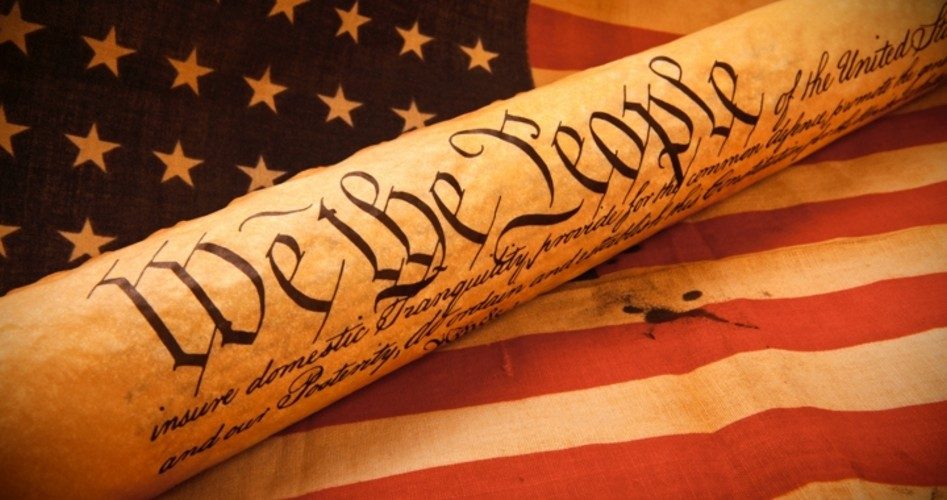
The headline over the news story contained the usual “fake news.” Or, as the case might be, opinion: “Trump claims he can defy Constitution and end birthright citizenship.”
Of course, Trump claimed no such thing. He did say he would sign an executive order ending birthright citizenship for the children of illegal aliens born in the United States. That birthright is a claim that arises out of a ludicrous interpretation of the 14th Amendment to the U.S. Constitution.
Trump divulged the plan in an interview with Axios on HBO, noting that his legal advisors say he can act without legislation from Congress.
What Trump Said
“It was always told to me that you needed a constitutional amendment. Guess what? You don’t,” Trump told Axios.
Axios told Trump “that’s very much in dispute,” and Trump replied: “You can definitely do it with an Act of Congress. But now they’re saying I can do it just with an executive order.”
Trump incorrectly noted that “we’re the only country in the world where a person comes in and has a baby, and the baby is essentially a citizen of the United States … with all of those benefits.”
But he correctly observed that “it’s ridiculous. It’s ridiculous. And it has to end,” he said. “It’s in the process. It’ll happen … with an executive order.”
Legal Opinions
While Axios quoted a Trump-appointed federal judge, who said birthright citizenship for illegal aliens is settled law, others disagree.
“The notion that simply being born within the geographical limits of the United States automatically confers U.S. citizenship is an absurdity — historically, constitutionally, philosophically and practically,” former Trump official Michael Anton argued in the Washington Post.
Constitutional scholar Edward Erler, Anton wrote, “has shown that the entire case for birthright citizenship is based on a deliberate misreading of the 14th Amendment. The purpose of that amendment was to resolve the question of citizenship for newly freed slaves.”
That’s because some Southerners wanted to deny the benefits of citizenship to blacks after the Civil War. Thus was the 14th Amendment necessary to secure full rights for blacks, with citizenship defined in the amendment’s first sentence. “All persons born or naturalized in the United States, and subject to the jurisdiction thereof, are citizens of the United States and of the state wherein they reside.”
But, Anton wrote:
The amendment specifies two criteria for American citizenship: birth or naturalization (i.e., lawful immigration), and being subject to U.S. jurisdiction. We know what the framers of the amendment meant by the latter because they told us. Sen. Lyman Trumbull of Illinois, a principal figure in drafting the amendment, defined “subject to the jurisdiction” as “not owing allegiance to anybody else” — that is, to no other country or tribe. Sen. Jacob Howard of Michigan, a sponsor of the clause, further clarified that the amendment explicitly excludes from citizenship “persons born in the United States who are foreigners, aliens, [or] who belong to the families of ambassadors or foreign ministers.”
Yet for decades, U.S. officials … have acted as though “subject to the jurisdiction” simply means “subject to American law.” That is true of any tourist who comes here. The framers of the 14th Amendment added the jurisdiction clause precisely to distinguish between people to whom the United States owes citizenship and those to whom it does not. Freed slaves definitely qualified. The children of immigrants who came here illegally clearly don’t.
Even Indians Weren’t Citizens
Anton also noted what constitutional scholar Lino Graglia did in his work on the subject. The famous citizenship case United States v. Wong Kim Ark, decided in 1898, is not dispositive for advocates of birthright citizenship. Ark successfully argued that he was a citizen because he was born in the United States. But his parents were not illegal aliens. They were legal residents. Thus, that case does not apply to illegal-alien children.
How closely did the courts guard citizenship? In 1884, writing in Elk v.Wilkins, the U.S. Supreme Court said American Indians were not citizens. So in 1924 Congress passed the Indian Citizenship Act to ensure that Indians were, indeed, citizens.
As for the headline writers at CNN, perhaps they should leave the constitutional exegesis to people who know something about it.




